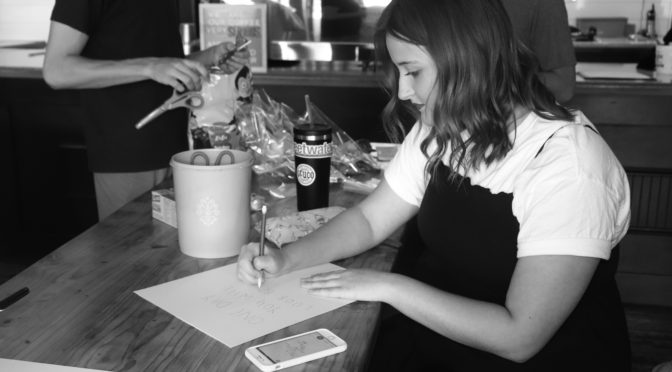MHS raising mental health awareness
Chelsea Strutton
Writer
With September being National Suicide Prevention Month, the Marlow High School Student Council (StuCo) is initiating the conversation of mental health and encouraging students to speak up if they are struggling.
By placing posters around campus displaying positive messages and providing the National Suicide Prevention Lifeline number, StuCo is supporting their peers who are in need of a listening ear.
According to World Health Organization, suicide is the third leading cause of death in 15-19 year olds.
In the United States alone, one in five teenagers suffer or have suffered from mental illness.
With adolescence being a crucial part in one’s development, mental illnesses—also referred to as mental health disorders—can impact a teenager’s social skills, confidence and more.
Some mental health disorders such as bipolar mood disorder can occasionally run in families, but the majority of mental illnesses are developed rather than being genetic.
When regarding how mental illnesses can be developed, there are many circumstances that can negatively impact a person of any age’s mental health including childhood trauma, use of drugs or alcohol, self isolation, social media and many more.
Having brought up the idea of raising awareness on campus, MHS senior and StuCo Vice-President Elena Holguin is passionate about talking about mental health and what students can do to reach out to one another.
Being a teenager herself, Holguin expressed why she thinks mental health is a big issue in today’s younger generations.
“I think the reason why mental health is such a big issue right now is because of our devices,” explained Holguin. “Social media shows us people that are beautiful and achieving such great things. Society tells us you have to be pretty, you have to be amazing, you have to keep going, you can’t settle where you are, if you’re content where you are, then it’s not good enough—you’re not doing enough. All of us are trying to always one up ourselves, and that creates a negative environment in our minds and tells us we’re nothing compared to these people that we see in person or on our phones.”
When asked why she thinks it is important to bring awareness to mental health and suicide prevention, Holguin spoke about supporting one another and reaching out to loved ones.
“I think it is important because if we break away from the stigma surrounding mental health and suicide prevention, then we can break each other out of our comfort zones.” Holguin continued, “If you know someone that is struggling, if you actually speak up and say something, what you’re saying is probably going to help that person and leave a positive impact. I think it’s really big to talk about it, to break the stigma, and to let people know that you’re there and you want them there as well.”
However, mental illnesses do not just impact the younger generations.
Around the world and in communities near and far, people of all ages, races and social classes are faced with circumstances that leave a lasting impression.
As reported by the National Alliance on Mental Illness, one in five adults experience a mental illness each year.
With anxiety disorder being the most common mental illness among adults in the United States, approximately 40 million people over the age of 18 struggle with anxiety each year—that’s 18.1% of the population.
With such a large percentage of the population diagnosed with a mental illness, coping mechanisms vary from person to person.
Healthy coping mechanisms include mental reframing, an exercise that involves taking a negative thought and turning it into something positive; breathing exercises such as “box breathing” in which allows someone to focus on breathing evenly; and of course talking to someone—what StuCo is encouraging students to do.
However, there are negative coping mechanisms too such as acting violently; fasting, a diet in which someone eats a very small or very large amount of food within a certain amount of time; and addiction, a disorder in which someone is addicted to a substance, object, individual or activity.
Offering a helping hand to those struggling with addiction and or mental health, Outreach Coordinator for the Ambrosia Treatment Center in Duncan, Oklahoma, Stephanie Morcom encounters countless adults and aids them in their road to recovery.
Morcom described the differences she has witnessed between generations regarding mental health and addiction.
“I have noticed a huge cultural difference in the initial ask for help,” stated Morcom. “I have found that some groups of people are more likely to seek help from their own peers and not ask for outside help. Services for substance abuse and mental health have not always been available to all people. I think we have some barriers to overcome as an industry, but as a whole, I believe we are inclusive to all, and my heart is open to help anyone that needs it.”
Leaving her interview on a positive note, Morcom reflected on the strength people contain and their ability to overcome obstacles.
“I believe that we all have the capacity to change, and there is always hope,” said Morcom. “We all have the power to rewrite our story, no matter how old or young we are.”
Although National Suicide Prevention Month is only recognized one month annually, the conversation of mental health and suicide are not to be strictly spoken about only in September of each year.
By breaking down the stigma surrounding mental health, the world can prevent thousands of deaths each year and grow closer as a positive, accepting society.
If in need of help or contemplating suicide, help is available by contacting Stephanie Morcom at (940)597-0955 or the National Suicide Prevention Lifeline at (800)273-8255.
